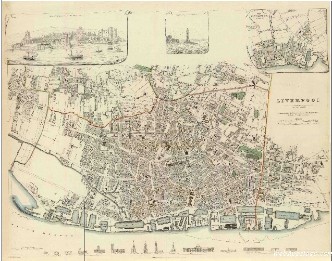
Liverpool in 1839, the year of William's Marriage
William had made the transition from Book-Keeper to Share Broker before 1845, and was listed in Gore’s 1847 Directory as having offices in Exchange Street East. Working in a port town such as Liverpool inevitably meant that William’s share dealings would have included maritime undertakings. One such included “The Merchant Traders’ Ship Loan & Insurance Association” which proposed an issue of 20,000 shares at £50 each in
November 1845 in order to raise the not inconsiderable sum of £1,000,000. William was the Liverpool agent in the sale and the advertising for the sale promised “A total absence of risk for the shareholders.” (4)
The autumn of 1856 saw William called for jury service in the case of Parry v Barnes, in which a Liverpool jeweller, Mr W J Parry sought to recover a lady’s debt from her husband. Being a businessman himself, William may have sympathised with Mr Parry, but that didn’t stop both him and the rest of the jury finding in the defendant’s favour. (8)